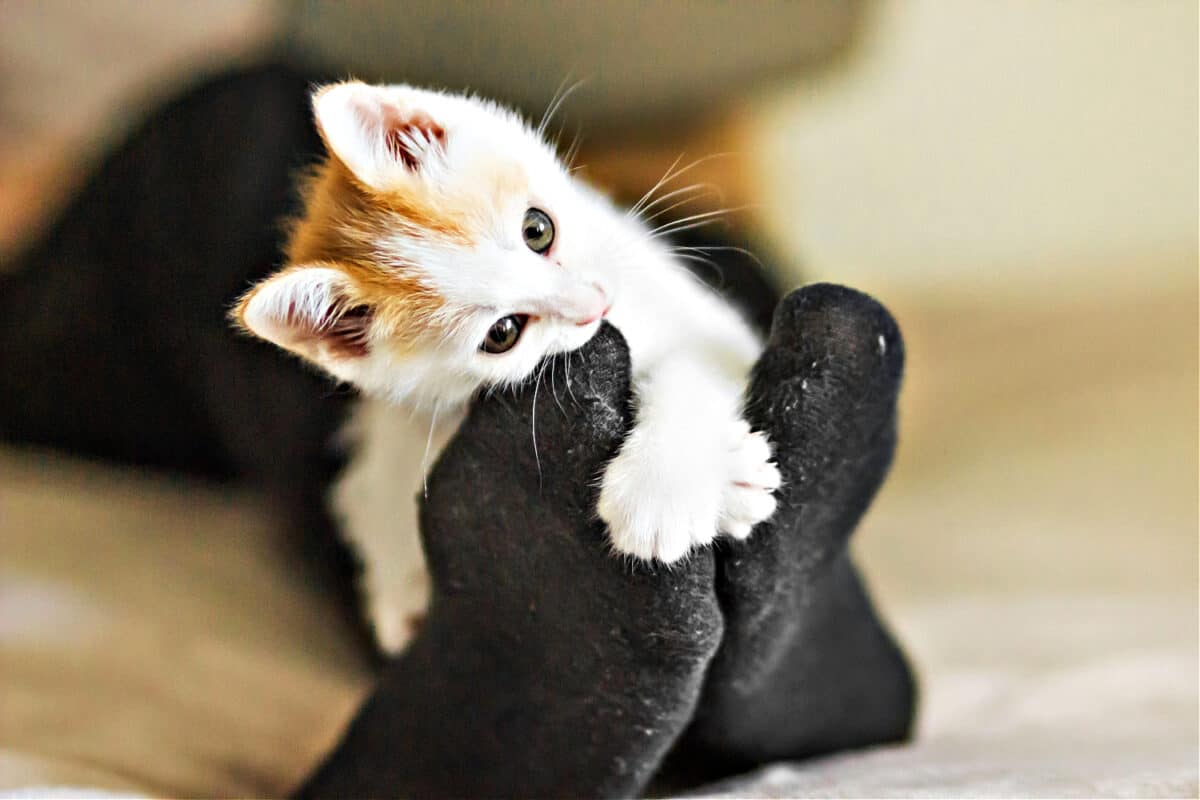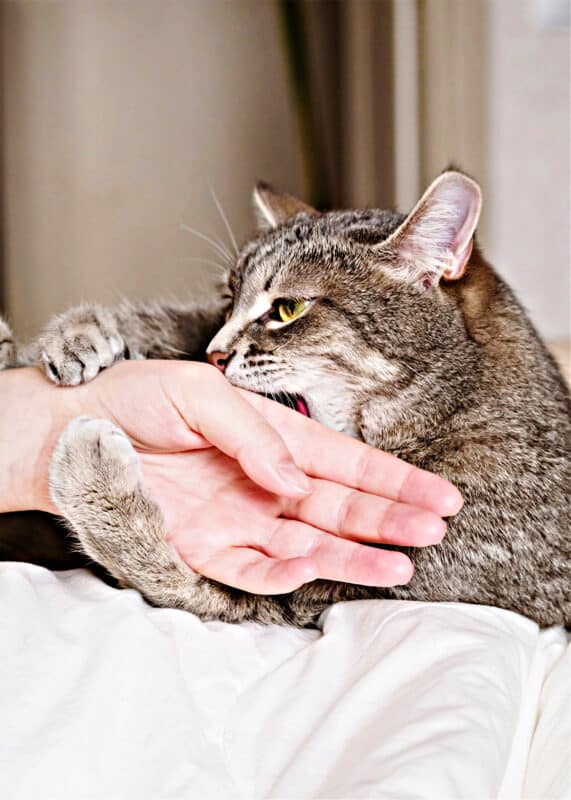"Why Do Cats Attack?" - an alarming question that probably hovers in the minds of many cat owners. What pushes these furry companions to bite or scratch? In this article, we will explain cat aggression, and expose the many possible triggers that cause these seemingly unprovoked attacks.
Whether it's against humans, fellow cats, or other animals, we will explore all facets of the matter. Keep reading to understand what makes them lash out and, importantly, how to navigate through and potentially cease these attacks.
The Motives: Why Does Your Cat Attack?
Have you ever experienced the shock of your cat lashing out at you or someone else? Or maybe it's another cat or pet that became the victim of your cat's seemingly sudden wrath.
You're certainly not alone in your struggle, as cat aggression is a frequent challenge faced by pet owners. The first crucial step in resolving this issue is understanding the root cause behind these attacks.
There are several possible reasons for cats to attack a human, a cat, or another animal. They include the following:
- Feeling threatened—including redirected aggression and territorial aggression.
- Pain or anxiety from being touched
- Rough play
Let’s continue with our in-depth look at the motivation of felines to bite, scratch, or otherwise attack - and what you need to do in order to stop the attacks.
Whom do cats attack (And how)
Before we analyze the motivations behind feline aggression, let’s see who is likely to be on the receiving end.
Cat attacks are usually against a human or another pet
Why do cats attack people?
When a cat bites or scratches a person, it’s important to differentiate between an attack against the cat’s owner, a family member, or a complete stranger.
If you were bitten by a cat, don't delay medical attention. The risks are explained here:
Cat Bites—What Every Cat Owner Needs To Know
An attack on a loving and trusted owner or family member is more likely to be caused by pain or redirected aggression. If you were bitten by your own cat, whom you know to be generally non-aggressive, it’s very possible that you touched a sore spot. This could be something as benign (yet painful!) as a hair mat or possibly a yet undiagnosed abscess.
However, an attack on a complete stranger is more worrying. Even cats who are afraid of strangers tend to stay away rather than attack. You’ll need to carefully investigate what happened.
More often than not, you’ll find that the cat was cornered in some way, possibly picked up by a stranger against her will. This can cause a cat to panic and lash out.
This is when you should also take into account the age of the person who’s been attacked. In many cases, cats bite or scratch a young child who was rough handling them.
In other rarer cases, cats attack people of a certain gender. If your cat attacks only men, it’s possible that he was abused—or otherwise traumatized—by a man in the distant past.
SIGN UP FOR THECATSITE'S EMAIL UPDATES >
Why do cats attack other cats or pets?
The other possible victim of a cat attack is often another resident cat or another pet, such as a dog.
Attacks again smaller pets such as rabbits, hamsters, birds, or pet reptiles are especially problematic, as they can be attributed to the cat’s hunting instincts. If your cat tried to attack a small pet, make absolutely sure you keep them separated in the future.
When another cat or dog is on the receiving end, consider how well the two animals know each other. If they’ve only just been introduced, you’re probably dealing with territorial aggression - which can be very severe.
You should probably separate the animals and go through the appropriate introduction process.
See these articles to learn more:
If your cat began to attack another cat or dog that they’ve known for years, the reason is less likely to be territorial aggression.
What you need to look into is stress-induced aggression, including that triggered by physical pain. Your cat could be ill, in pain, or scared of something else—taking it out on your other household pets.
Still not sure? Let’s take a more in-depth look at the things that make cats attack.
The motivations behind attacks
We’ve mentioned them earlier in this post, but now it’s time to analyze the possible reasons for a cat to attack someone else, a feline, or a human.

Fear-induced attacks
This is possibly the most common reason for the more vicious attacks by cats.
When a cat feels threatened, he or she will lash out. The severity of the attack is directly related to the intensity of the perceived threat. Note the emphasis on “perceived”. It doesn’t matter if that threat is real or not. What matters is how the cat views it.
Veterinarians sometimes find themselves on the receiving end of fear-induced cat attacks. Kitty doesn’t realize that the person in the white coat is there to help her. As far as she’s concerned, she has been transferred to an alien—and potentially hostile—environment.
And now this person—whom she may remember from previous scary visits—is trying to grab her. No wonder Kitty will do anything in her power to save herself!
Redirected Aggression
Redirected aggression is actually a type of fear-induced aggression, with one significant difference:
In this case, the threatened cat lashes out at someone other than the source of the perceived threat.
We can actually go back to the vet’s office for example. A cat may be afraid of the veterinarian and the clinic, yet lash out at her loving owner when said owner is trying to pet her.
That isn’t to say that the cat fears her loved and trusted owner. She’s simply in an extreme state of anxiety, in full “fight or flight” mode.
She will lash out at any hand that reaches out to her at this point—regardless of whether she’s afraid of that specific person or not.
For more examples of redirected aggression and how to deal with it, see this article:
Re-directed Aggression In Cats
Territorial aggression
Cats are territorial. Some more so than others.
If they find a strange cat or pet in their established territory, they will feel threatened. Again, it doesn’t matter whether the threat is real. It could be just a tiny harmless kitten or puppy.
Once fear—not to say panic—kicks in, your cat will either flee or fight. And if the latter, you’ll have a case of territorial aggression on your hands.
As mentioned above, the key here is to properly introduce cats to new pets. Never bring a new cat home and just plop it in the middle of your living room.
That would be unfair to both cats. Follow an introduction protocol that will help your cat learn that the newcomer isn’t really all that dangerous.
Attacks induced by pain or anxiety
The next category of reasons for feline aggression covers pain and discomfort.
It may be actual pain that’s driving Kitty to attack. A common scenario could be this: A cat has a sore spot on her body. Often this could be a localized infection of some sort. While grooming or just petting the cat, the owner unknowingly touches that spot. Within a split second, Kitty’s teeth could be sinking deep into that caressing hand.
Consider this a mode of self-defense, as far as the cat is concerned. That hand has hurt her considerably, so it needs to be dealt with.
It’s also worth mentioning that general pain and discomfort can make anyone grumpier than usual, cats included. That’s why a sudden attack from an otherwise relaxed cat warrants a visit to the vet.
Attacks following petting
Experienced cat people may be familiar with the phenomenon.
A cat seems to be begging for petting, head butting, and even rolling on her back to get your attention and affection. She purrs as you pet her.
A few minutes later, that same cat turns into a Mr. Hyde, viciously attacking you and running away.
What happened here?
Some cats have a low tolerance for prolonged petting. They enjoy the interaction and come asking for it, but if it lasts for too long, they become uncomfortable. While no actual pain is involved, a high-strung cat can lash out just as badly following a petting session that goes on for too long.
Read more:
Do Cats Like To Be Petted?

Rough play
Finally, the third broad category involves “fake attacks”. In other words, rough play.
This is typically why kittens bite and scratch their owners—or other pets around them. And it can be painful.
The important thing to understand here is that this is only a game. You should not encourage your kitten to attack you, and there are ways to help her direct that aggressive pent-up energy elsewhere.
The key here is to provide your kitten with plenty of stimuli, like fun toys and interactive games that will direct her to attack the toy - and not your hands.
Read more:
Bored Cat? What Cat Owners Need To Know (including 10 Actionable Tips)
The role of temperament: Why some cats are more likely to attack
Now that we’ve covered the main reasons why cats attack, it’s worth noting that a lot depends on the cat’s personality.
Some cats are more prone to attacking humans, pets, or both. These cats are usually generally high-strung and fearful. Instead of hiding - as many shy cats do - they tend to bite or scratch people and pets around them.
Other cats appear to be especially relaxed and easygoing. These cats almost never attack—even when confronted with a new cat in their home or another stressful situation. These are the cats that become therapy cats—able to cope with new places and situations while always remaining friendly and approachable.
Most cats are somewhere in between. They’re not generally aggressive but will lash out if they feel threatened.
What to do when your cat attacks?
Now that you know the possible reasons for feline aggression, you can follow the links provided here and learn how to prevent these attacks.
The specifics will be related to the reason. A mischievous kitten that scratches people’s ankles needs to be dealt with differently from a cat who viciously attacked someone because she’s just spotted a strange feral cat outside.
The one rule which always holds true is—don’t punish your cat.
Yes, being scratched or bitten can hurt. A lot. And it can be scary when unexpected. However, you must make an effort not to shout, reprimand or otherwise punish or scare your cat following an attack. In many cases, it will only lead to a cycle of fear and further aggression.
A note about Rabies
While we have mentioned here that there can be a physical illness or injury behind a cat’s attack, it’s worth elaborating on one specific condition: rabies.
Rabies is a lethal disease that can spread from one mammal to another. Once the virus reaches an animal’s brain it affects its behavior. In many cases, that change in behavior includes increased aggression.
If you notice a non-vaccinated cat becoming very aggressive, for no apparent reason, talk to your veterinarian immediately. Even if the cat only stays indoors. The risk of having a rabid cat in your home is simply too high to ignore.
SIGN UP FOR THECATSITE'S EMAIL UPDATES >
Read more:
Do Indoor-only Cats Need Rabies Shots?
Finally - if you have any questions regarding your own cat's aggression, please start a thread in the cat behavior forum and ask there. We do not monitor comments in articles, so the forums are the place for all your questions.
Note: We may get commissions for purchases made through links on this page.




5 comments on “Why Do Cats Attack? A Closer Look at Cat Aggression And Its Causes”